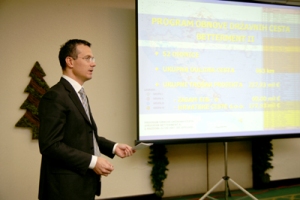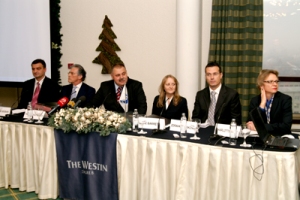- Published: 12.12.2006.
Croatia: EIB & EBRD Support Building of Roads
 The European Investment Bank (EIB) lends EUR 60 million to the Republic of Croatia for the rehabilitation of 687 km of the Croatian national road network divided to 52 sections across the country.
The European Investment Bank (EIB) lends EUR 60 million to the Republic of Croatia for the rehabilitation of 687 km of the Croatian national road network divided to 52 sections across the country.
The loan will contribute to the implementation of the Croatian Program for the Construction and Maintenance of Public Roads for the period of 2005-2008.
Croatia is an important transit country for passenger and goods and an adequate transport infrastructure will help the country to better integrate with the European Union’s Single Market.
In addition, it will increase the transport safety and capacity needed to face successfully the increasing number of vehicles since the recent years.
The project is focused on the modernization and maintenance of roads along major Croatian transport arteries with positive implications for the development of the tourism industry being one of the most significant sectors for the country’s economic development.
 The state owned Croatian Roads Ltd. (CR), is the project’s promoter as well as the borrower and the final beneficiary of the loan. The current loan is a continuation of a successful cooperation of the Bank with this company.
The state owned Croatian Roads Ltd. (CR), is the project’s promoter as well as the borrower and the final beneficiary of the loan. The current loan is a continuation of a successful cooperation of the Bank with this company.
In 2001, the EIB provided a loan of EUR 60 million to the CR for co-financing the rehabilitation of the national road network and in July 2005 the Bank signed with the CR another loan of EUR 60 million for the construction of the bypass road of the city of Split.
In order to build the last section of the eastern bypass in Rijeka, between the towns of Sveti Kuzam and Križišće in north-west Croatia, EBRD is lending the Croatian roads EUR 40 million. It will also finance two roads that connect to the bypass.
The State Secretary of Development at the Ministry of the Sea, Tourism, Transport and Development Zdravko Livaković, reminded everybody after the signing of the contracts that the loan would help complete the bypass offering motorists an alternative route around Rijeka, therefore avoiding the city centre. According to him it would also help promote road-sector reform through the introduction of performance-based maintenance contracts to increase effectiveness and to lower costs of road maintenance in Croatia, adding that it would also mean a lot for the development of the Rijeka port.
 Riccardo Puliti, EBRD Director for Transport, said traffic congestion, pollution and concerns for safety around the city of Rijeka have worried residents and tourists for many years. Once the bypass is complete, many of these concerns will be dampened as traffic flow will mostly be directed around the city, said Mr Puliti.
Riccardo Puliti, EBRD Director for Transport, said traffic congestion, pollution and concerns for safety around the city of Rijeka have worried residents and tourists for many years. Once the bypass is complete, many of these concerns will be dampened as traffic flow will mostly be directed around the city, said Mr Puliti.
As well as benefiting residents and tourists, the new bypass will help support those businesses heavily dependent on the road network for trade purposes, he added.
The project builds on an EBRD strategy to develop road networks in Croatia. With this loan, the Bank has provided more than EUR 270 million to finance six road sector projects in the country. These include administrative reforms aimed at improving the management and development of the road network, and preparation and implementation of national road plans.
The EBRD is one of the largest investors in Croatia having committed more than EUR 1.8 billion in 75 projects.


